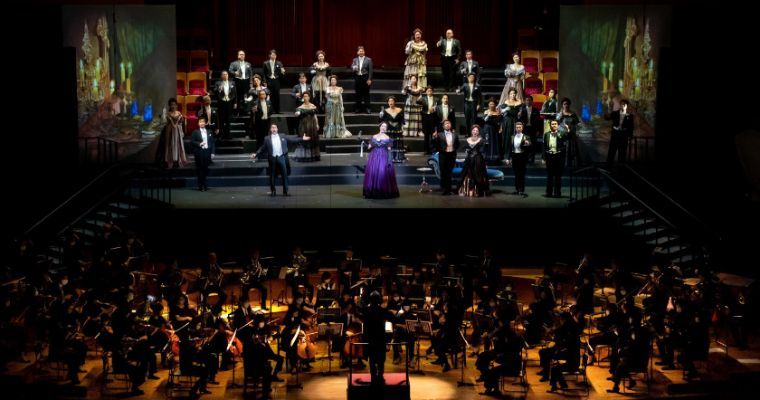Opera, says Italian conductor Nicola Luisotti, should engage all our senses – our eyes and ears, of course, but also our hearts, our emotions, the very core of our being. That requires the audience to be totally involved and able to see how everything fits together, which is why he so enjoys conducting Hall Opera®, the opera performances that Tokyo’s Suntory Hall put on every five years on the occasion of their anniversaries. Conductor and orchestra are not hidden away in a cavernous pit, but are right there on stage, in full view of approximately 2,000 seats. “The orchestra is a very important part of the show. If you can’t see the conductor and the players, how can you judge the connection between them and the singers?”, asks Maestro Luisotti. “When an audience can see the orchestra as well as the singers, they become truly involved.”
It’s the philosophy that drove the layout of the hall. Leading musicians and conductors, including the late Herbert von Karajan, advised on the hall’s design which, when it opened in 1986, was the first in Japan to adopt a vineyard style of seating. All seats are directed towards the stage – just as terraces of vines are orientated towards the sun – with the theory that “the sound then showers down on all seats, like rays of sunlight”. The aim was for both musicians and audience to feel that they were in harmony with each other and to be fully immersed in the experience.
Luisotti, who was music director of the San Francisco Opera from 2009 to 2018 and is a frequent guest at the Metropolitan Opera New York, La Scala Milan and the Vienna State Opera, believes that the hall has achieved those aims, and was unabashed in his admiration for it and its special acoustic. “I love conducting here. The sound is so special,” he said. He believes the acoustic quality of the hall allows it to easily transform into an opera venue without the need for a pit, with the singers performing on a large platform raised above the orchestra.
He was speaking to me in a break between rehearsals for Verdi’s La traviata, which was staged at Suntory Hall with the Tokyo Symphony Orchestra on 7th and 9th October as part of the celebrations marking the 35th anniversary of the hall’s inauguration. A warm smile spread across his face as he talked enthusiastically about his long association with the hall and about the latest production.

He was unstinting in his praise for the cast, which featured Czech soprano Zuzana Marková as Violetta. “This is the first time I have conducted her. She is a fantastic singer and actress – and also happens to be a wonderful pianist.” Marková has made Violetta one of her signature roles, having recently sung it at the Teatro Comunale in Florence, Bolshoi Theatre in Moscow, and Atlanta Opera. Alfredo was sung by Italian tenor Francesco Demuro, who made his Japanese debut at Suntory Hall in 2010 as Ferrando in Mozart’s Cosi fan tutte, conducted by Luisotti. Germont was Polish baritone Artur Ruciński, “He’s sung the role at Covent Garden, the Metropolitan Opera and in Madrid, but this was the first time he has sung it with me. He’s great: we are just one big family,” said a beaming Luisotti. “When you have a good cast and a good orchestra you will make beautiful music; if you have a bad team, even at La Scala it won’t go well!”
Young artists just starting their careers, who trained either at the Suntory Hall Opera Academy or Biwako Hall Vocal Ensemble, were also appearing in La traviata. Mezzo soprano Mae Hayashi, for instance, sang Flora Bervoix, soprano Haruna Mito was Annina, and Doctor Grenvil bass-baritone Masumi Goto. “It’s great that these young artists have this opportunity,” said Luisotti, again with that generous smile. “It’s a beautiful thing.” Current fellows at the Suntory Academy also sang alongside the New National Theatre Chorus, getting some valuable early experience of appearing in a big, professional production.
A strong focus on the emotional drama of the piece is a hallmark of any Suntory Hall performance, and La traviata was no exception. Stage Director Michiko Taguchi enhanced the simple stage sets with striking projection lighting, throwing the audience’s attention onto the unfolding tragedy. Luisotti still finds himself profoundly moved by the piece, despite having conducted it many times, “When we perform La traviata we have to convince the audience that Violetta will die. It doesn’t matter how many times you have heard it, you will believe it again and again and again.” Reflecting on the tragedy of the story, Luisotti said: “La traviata belongs in the 19th century. It is not of our time. In fact, it helped change our attitudes. That kind of society no longer exists, but we still cry for Violetta.”
Performing an intimate scene such as Violetta’s death presents no problems despite the size of the hall, he told me, because the vineyard layout means that every member of the audience has direct sight-lines onto the stage and a direct connection with the action. And he speaks with the knowledge of someone who has a distinguished record with Suntory Hall productions, where between 2004 and 2010 he conducted both a Puccini series (Tosca, La Bohème and Turandot) and a Mozart/Da Ponte series (La nozze di Figaro, Don Giovanni and Così fan tutte) which he conducted from the fortepiano.
Luisotti also believes the Tokyo audience to be a very discerning one. “They are very sensitive; they know when to applaud and when not to applaud. They are experts in the field of opera, they know the music well – we have to be careful!” He was also full of praise for the standard of musical training in Japan. “I have conducted many orchestras around the world – in London, Milan, Rome, New York – and I have never met one without Japanese players. They are superb.”
Asked if there was one opera that he would like to perform at Suntory Hall that he has not yet had the opportunity to conduct there, he replied without hesitation: Otello. “I can just imagine the first 10 minutes with chorus and big orchestra in this great acoustic. I think it would be sensational. We have done the Verdi Requiem here and it was extraordinary. We are so lucky to have so many fantastic choirs and choral societies in Tokyo: they are very serious singers.”
Luisotti’s sunny, genial face crumpled when he talked of the toll that Covid has taken on live performance over the past 18 months. “It’s been awful, but we are going towards the light. We need contact; we need to laugh and we need to lead a normal life, but for the moment we are still inside this awful story and trying to survive. Art is a great thing; it allows people to have hope for the future, to have trust in the future.”
And then he brightened, that playful smile returning to his lips. “You know, music is a big island where we speak the same language. We are musicians, not nationalities – a great metaphor for a happy world. I hope one day we will exist without borders, a world in harmony. And remember, music is also a goddess, not a god – and we need more goddesses!”
This article was sponsored by Suntory Hall.


